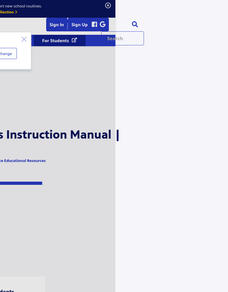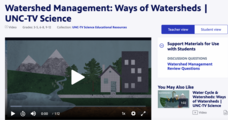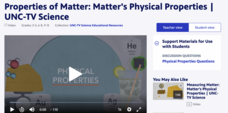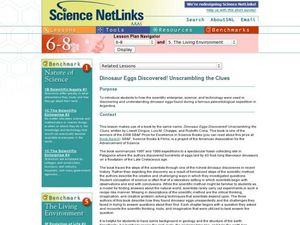TryEngineering
Graphics: Bits and Points
What can a mural teach pupils about computer science? The lesson has scholars create a mural on a wall to learn about bitmap and vector graphics. Along the way, they learn about the graphics coordinate system.
Google
Wonder Woman
Training for battle is really a set of sequences, just like computer science. Scholars program a code that guides Diana from Wonder Woman through a path that avoids her enemies. They learn about how sequences play a role in computer...
Google
Teacher Appreciation
Show your teacher you care. Young scholars use the Blockly programming language to create a card for their teachers. Using variables, encapsulation, objects, and sequences helps advance their computer science knowledge at the same time.
Google
Code for Equality
It's my belief that all learners should have equal access to computer science projects! Young computer scientists learn about variables, encapsulation, sequences, and objects in block-based coding. They create a collage by first...
Google
Mary Poppins Returns
Make Mary Poppins proud. Young computer scientists use block-based coding to create snowflake animations with a Mary Poppins theme. They learn how to apply sequences, actions, and loops in computer science.
PBS
Reflection and Refraction | UNC-TV Science
Uncover the exciting interactions of light energy and matter ranging from color to optical illusions. Participants explore color using red and green apples, differences between reflection and refraction, and descriptions of related...
PBS
What's the Matter? | UNC-TV Science
Explore what makes up the universe and demystify the complex ideas of matter and the atom. Group members watch a video with explanations, animations, and examples that discuss the characteristics and importance of matter. Scholars then...
PBS
Genes 101: Life’s Instruction Manual | UNC-TV Science
Discover the common genetic ground shared by humans and chickens. Group members listen and view an animation about genes and proteins, which details their roles in building biological structures such as tissues and organs. Participants...
PBS
Genome 101: Life's Instruction Manual | UNC-TV Science
Crack open the mysteries inside a genome. Participants view an animated video describing the relationship between DNA, genes, proteins, chromosomes, and an organism's genome. A post-video worksheet allows pupils to apply knowledge by...
PBS
Volume and Amplitude | UNC-TV Science
Future physicists pump up the volume while discovering the world of sound waves. Group members learn about the qualities of sound waves, the relationship between energy and sound volume, and the definition of amplitude while viewing an...
PBS
Watershed Management: Ways of Watersheds | UNC-TV Science
Inspire young conservationists to protect the environment with a short activity on water quality and watersheds. Participants discover the importance of watershed management, learn about water quality problems, and discover possible...
PBS
The 3 Phases | Phases of Matter | UNC-TV Science
Explore the states of matter without the mess or expensive equipment in a compact, informative activity. Scientists watch as the narrator explains the three states of matter using a glass of ice and soda in an animated video that...
PBS
Phase Changes | Phases of Matter | UNC-TV Science
Take an energetic ride through the phase changes of a water molecule in a compact activity. Young scientists learn about the phases of matter and discover the role of thermal energy in governing phase changes while watching a short...
PBS
Properties of Matter: Matter's Physical Properties | UNC-TV Science
Does gold really boil? Learn what temperature gold boils at and more using an animated activity about the properties of matter. Scientists learn about the properties of matter including examples of physical properties, the effect changes...
PBS
Convection: Heat Transfer | UNC-TV Science
Learn why what goes up must come down in both air and liquids. Investigators discover how convection transfers thermal energy and the movement of particles in liquids and gases due to density differences by viewing an animated video....
PBS
Thermal Energy 101: Heat Transfer | UNC-TV Science
Discover what makes a cup of tea feel hot one minute and cold the next. Young physicists learn about thermal energy, why substances feel hot or cold, and the three means of thermal energy transfer: conduction, convection, and radiation...
PBS
Thermal Radiation: Heat Transfer | UNC-TV Science
What do people, campfires, and microwaves have in common? Investigators explore heat transfer by thermal radiation, discover the role of electromagnetic waves, and see examples of radiation while viewing a video. Scholars challenge their...
Curated OER
Windbreakers; Earth Science, Topography, Weather
Pupils consider how topography affects weather and human activity. Students simulate a mountain range and observe surrounding wind patterns.
Curated OER
Science: Discovering Sharks
Pupils incorporate some basic information regarding ocean life and ecological conservation into their "earth watch" lives.
Curated OER
Science Unit Lesson Five
Sixth graders review how and which plants operate in terrariums. In groups, they follow instructions to make their own terrarium and place different types of plants in it. To end the lesson, they review the steps in the water cycle and...
Curated OER
River of Venom
Read an exciting science mystery about killer bees online, evaluate a list of clues, and try to answer the questions correctly. The story responds to the reader's choices and presents research material for the next step. Though the...
Curated OER
Volcanoes in Space
Pupils research volcanoes on the Internet to compare/contrast the volcanoes on Earth to the ones found on Io, a moon of Jupiter. Students list the similarities and differences in science journals, and illustrate pictures of the volcanoes.
Curated OER
Dinosaur Eggs Discovered! Unscrambling the Clues
Just a heads up: this lesson is based on a book, Dinosaur Eggs Discovered! Unscrambling the Clues. If you do not have or do not want to purchase the book, you may still find the other activities and worksheets useful in your earth...
Smithsonian Institution
Watching Crystals Grow
Amazing science can sometimes happen right before your eyes! The class gets cozy as they watch crystals grow. They use Epsom salts, rocks, and food coloring to create crystals. They'll observe the entire process, documenting every step...
Other popular searches
- Earth Science
- Physical Science
- Life Science
- Science Project
- Science Space
- Environment Science
- History of Science
- Environmental Science
- Pe Science
- Family and Consumer Science
- Consumer Science
- Social Science

























